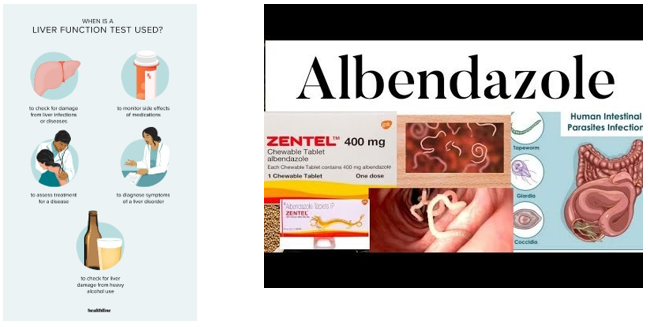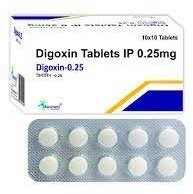A client who is taking albendazole reports experiencing fatigue, nausea, and dark urine. The nurse observes a yellowing of the client’s skin and sclera. Which lab results should the nurse review?
Renal function panel.
Thyroid function test.
Basic metabolic panel
Liver function test.
The Correct Answer is D
The client's symptoms suggest liver dysfunction, which is a known adverse effect of albendazole. Albendazole is primarily metabolized in the liver, and its use can cause liver damage in some cases. Therefore, it is essential to review liver function test results to assess the severity of liver damage and to determine if the medication should be discontinued or the dosage should be adjusted.
The renal function panel (a) measures the levels of various substances, such as creatinine and blood urea nitrogen, in the blood to assess kidney function.
The thyroid function test (b) evaluates the levels of thyroid hormones in the blood to diagnose thyroid disorders.
The basic metabolic panel (c) includes several tests that assess the levels of electrolytes, glucose, and other substances in the blood to evaluate metabolic function. However, these lab tests are not directly related to the symptoms and adverse effects associated with albendazole use

Nursing Test Bank
Naxlex Comprehensive Predictor Exams
Related Questions
Correct Answer is C
Explanation
Digoxin is a medication commonly used to treat heart failure by strengthening the heart's contractions and slowing down the heart rate. However, it can also cause nausea, vomiting, and loss of appetite, especially when levels in the body are too high. Furosemide is a diuretic medication that helps to remove excess fluid from the body, which is often necessary in heart failure. However, it can also cause electrolyte imbalances, such as low potassium levels, which can contribute to nausea and vomiting.
Therefore, in a client with heart failure who is experiencing these symptoms, it is important to assess their medication regimen, including dosages and serum levels, to ensure that they are not experiencing medication side effects or toxicity.
Adjustments may need to be made to the client's medication regimen to manage symptoms effectively and prevent further complications. Options (a), (b), and (d) do not have as direct a correlation to the current symptoms and would not have the same level of significance when planning care for this client.

Correct Answer is A
Explanation
Levothyroxine is a thyroid hormone replacement medication used to treat hypothyroidism. To ensure proper absorption and effectiveness of the medication, it should be taken on an empty stomach, preferably in the morning, and at least 30 minutes before eating. Therefore, when the client indicates that they understand the need to take the medication on an empty stomach, it indicates that the education was effective.
Option b, "Avoid the use of iron supplements," is also important education for clients taking levothyroxine because iron supplements can interfere with the absorption of the medication. However, it is not the best indicator of effective education because the question asks for the statement that indicates education was effective, and option a is a more direct and specific response to the medication.
Option c, "Administer levothyroxine at bedtime," is not accurate information because the medication should be taken in the morning on an empty stomach.
Option d, "Consume foods that are high in iodine," is not recommended for clients taking levothyroxine because high amounts of iodine can interfere with thyroid function. Therefore, this statement indicates a need for further education.

Whether you are a student looking to ace your exams or a practicing nurse seeking to enhance your expertise , our nursing education contents will empower you with the confidence and competence to make a difference in the lives of patients and become a respected leader in the healthcare field.
Visit Naxlex, invest in your future and unlock endless possibilities with our unparalleled nursing education contents today
Report Wrong Answer on the Current Question
Do you disagree with the answer? If yes, what is your expected answer? Explain.
Kindly be descriptive with the issue you are facing.
